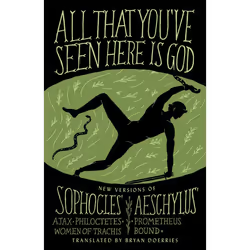
ISBN All That You’ve Seen Here Is God
ISBN All That You’ve Seen Here Is God, Classics, English, Paperback, 480 pages
Similar Products
Product Information
All That You’ve Seen Here Is God
These contemporary translations of four Greek tragedies speak across time and connect readers and audiences with universal themes of war, trauma, suffering, and betrayal. Under the direction of Bryan Doerries, they have been performed for tens of thousands of combat veterans, as well as prison and medical personnel around the world. Striking for their immediacy and emotional impact, Doerries brings to life these ancient plays, like no other translations have before.
About author(s)
Aeschylus was born of a noble family near Athens in 525 BC. He took part in the Persian Wars and his epitaph, said to have been written by himself, represents him as fighting at Marathon. At some time in his life he appears to have been prosecuted for divulging the Eleusinian mysteries, but he apparently proved himself innocent. Aeschylus wrote more than seventy plays, of which seven have survived: The Suppliants, The Persians, Seven Against Thebes, Prometheus Bound, Agamemnon, The Choephori, and The Eumenides. (All are translated for Penguin Classics.) He visited Syracuse more than once at the invitation of Hieron I and he died at Gela in Sicily in 456 BC. Aeschylus was recognized as a classic writer soon after his death, and special privileges were decreed for his plays.
Sophocles, the Greek tragic dramatist, was born at Colonus near Athens about 496 B.C. Although hopelessness and misfortune plague the characters in his great plays, Sophocles’s own life was a long, prosperous one. He was from a good family, well educated, handsome, wealthy, healthy, and highly respected by his fellow Athenians. His first dramatic production, in 468, won the prize over Aeschylus’s. He wrote two dozen more plays before 450, by which date he had made important changes in the form of tragedy by adding a third speaking actor to the traditional two, by reducing the importance of the chorus, and by improving the stage scenery. Sophocles wrote over 120 plays; seven complete plays survive (plus half a light satyr play, some fragments, and ninety titles). Aristotle, in his Poetics, praised Sophocles above other tragedians and regarded his masterpiece, OEDIPUS THE KING, as a model for Greek tragedy. Sophocles’s plays won more victories than the plays of either his older contemporary Aeschylus or the younger Euripides. The circumstances of his life, as well as his plays, suggest that Sophocles was conservative, and opposed to innovation in religion and politics. At eighty-three he was still active in the Athenian government. He died in 406 B.C. in Athens at the age of ninety.
Customer Reviews
Share your opinion on the product or read reviews from other members.










